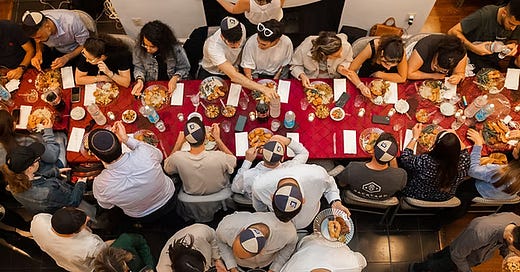One D.C. night four years ago, my friends and I wandered into a small house for an intimate Shabbat dinner. Just ten people sat around the table; five came from the Rabbis’ family, and the other half—well, us. Some of us felt rather awkward at first. But something about that Shabbat experience—being with people we were just getting to know, yet who already felt like family—drew us in. We felt a quiet sense of belonging, and we kept coming back.
Eventually, our group of five committed to helping Chabad at The George Washington University (GW) grow. For the past four years, I’ve had the honor of serving on the board of Chabad GW. This past year, I served as President.
Today, our Shabbat dinners host over fifty students, and we often struggle to fit enough tables and chairs in the house, prompting dreams of building a second floor. We’ve hosted events with prominent public officials, attended hearings on Capitol Hill, and most importantly, created Jewish experiences that allowed us to take pride in our identity and, in the motto we coined, “fight antisemitism with robust Semitism.”
At last night’s graduation-themed Shabbat dinner, I gave a speech to bid farewell to my college years at Chabad GW. An excerpt of my speech, or as we say in D.C, “Presidential Farewell Address,” is in the paragraphs that follow:
“Where is God?”The Great Rebbe replied, “Wherever He is allowed in.”
People around the world allow God into their lives in many ways. For Jews, the big idea—our starting point—is belief in one God.
Belief in one God is at the core of Judaism, but it is also shared by many others. Christians and Muslims, emanating world’s two largest religions, also believe in one God. But here’s where Judaism stands apart: we believe we’re created in God’s image. Each of us carries within us a piece of the Divine. Believing in God also means believing in ourselves.
During my time in college, it was easy to lose faith. Disillusioned by performative progressivism, confronted by antisemitism from both peers and professors, and above all, shaken by the tragedy of October 7, 2023, and the turmoil on campus that followed.
But at Chabad GW, faith comes alive. Belief is not just present: it’s rooted. Belief in God, yes, but also in ourselves and in one another. Each person who came to Shabbat dinner rekindled that faith and kept me going through these challenging times.
Another unique part of Judaism is how we understand human nature. We’re not born into sin, like in Christianity. And we’re not compelled to submit, like in Islam. Judaism teaches that questioning is holy. That we grow by wrestling with ideas, with each other, with God. We nourish our souls through prayer, but also through rigorous thought. And in that, we are given freedom: the highest form of responsibility.
Traditionally, we are taught that everyone is born with both a good inclination and an evil one. But the Rebbe reframed even that notion. Because there is one God, and God is good, all of God’s creations must also be essentially good. That belief is why we have free will—not to be trapped by temptation, but to rise above it, and choose good.
And that is why, in the Rebbe’s words, we must always hold on to “a deep hope and unwavering faith that things will be better than they are.” Judaism, in that sense, is a remedy for a world drowning in pessimism.
We Jews, by our very nature, are eternal optimists. We are called to rise, courageously, and with confidence.
“We live in a state of emergency,” the Rebbe said, “where the fires of confusion are raging. When a fire is burning, everyone is responsible for helping his fellow man.”
Chabad GW has built a community at GW that lives by the Talmudic principle: “במקום שאין אנשים השתדל להיות איש”— “In a place where there are no men, strive to be a man.”
When I first arrived at GW, I didn’t know if or how I’d get involved in Jewish life. It wasn’t until I experienced my first Shabbat that I knew Chabad would become my spiritual sanctuary. I didn’t know it would also shape my college journey, my identity, and yes: my life.
My gratitude goes beyond achievements and milestones. Through Sinai Scholars, I studied Torah and dove into deep conversations about philosophy, politics, and beyond. Through challah bakes, Havdalah, and holiday celebrations, we laughed, we sang, we became a family.
It was here—more than anywhere else at GW—that I built lasting friendships and found a community that taught me as much, if not more, than any class or internship. I learned to lead with trust. I learned that leadership isn’t about control—it’s about inspiration. And I realized that, in the Rebbe’s words, “Whatever task lies in your hand, do it with all your might.”
As a Freshman, our Shabbat dinners fit around one long table of maybe ten. That camaraderie is what pulled me in. And even now, with a packed house, where we struggle to fit everyone in weekly for Shabbat, the camaraderie, warmth, and authenticity have not faded. That is the magic of Chabad GW.
As I prepare to graduate, I carry with me more than memories—I carry a mission. Chabad GW didn’t just give me a home. It gave me a foundation. It reminded me that belief in God must be matched by belief in ourselves. That our Jewish identity isn’t just something to preserve, but something to live—and to lead with.
And to my fellow students: go forward with conviction, with courage, and with pride, knowing that we are each a reflection of God, and that our chapter in the story of the Jewish people is only beginning. For we are the ones writing it.





Wonderful words. Also very inspiring as I'm going into my senior year in fall also president of my chabad on campus. Keep up the amazing activism and writing!